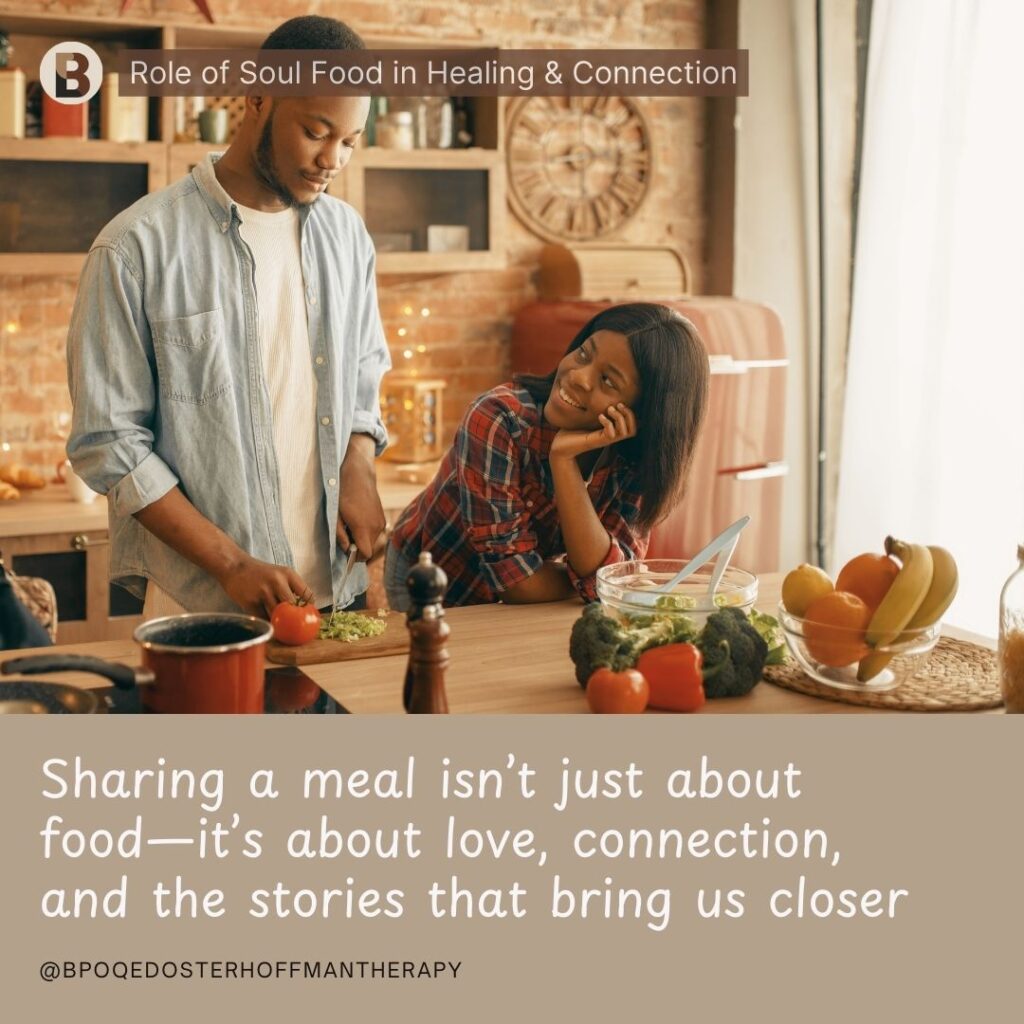Table of Contents
Soul food is more than just a cuisine—it’s a cultural experience, a memory, and a form of connection that has shaped Black families for generations. Whether shared at Sunday dinners, reunions, or community gatherings, soul food brings people together and nurtures the bonds that support emotional well-being.
At BPOQe, we believe in the power of cultural practices, like food traditions, to foster healing, build resilience, and strengthen community ties. Let’s explore how soul food can be a source of emotional nourishment and a reminder of the importance of connection in Black culture.

Why Soul Food Is More Than a Meal
Soul food originated as a means of survival and innovation, transforming limited ingredients into flavorful, comforting dishes. Over time, it became a symbol of resilience, identity, and togetherness. Today, soul food continues to play a vital role in fostering emotional and cultural connections.
Creating a Sense of Belonging
Community gatherings centered around soul food offer a sense of belonging and support, especially in times of hardship. These moments remind us of the strength found in unity.
Building Family Bonds
Sharing a meal is one of the most intimate forms of connection. Preparing and enjoying soul food creates opportunities for storytelling, laughter, and generational bonding, nurturing family ties and emotional security.
Preserving Cultural Identity
Cooking traditional dishes is an act of preserving heritage. It allows families to honor their history and pass down cultural practices that affirm their identity and pride.
Reconnecting to Tradition in Modern Times
As life gets busier, many families are moving away from traditional practices like Sunday dinners or home-cooked meals. Reintroducing these rituals can provide stability and grounding, especially for children and teens navigating a fast-paced world.
Host Community Potlucks: Bring friends and neighbors together to celebrate soul food and build meaningful connections.
Encourage Family Cooking Nights: Turn meal prep into a shared experience where everyone participates, fostering collaboration and communication.
Rediscover Forgotten Recipes: Look through family cookbooks or ask elders to share their favorite recipes, keeping cultural traditions alive.
The Emotional Healing Power of Food
Food, especially soul food, is often intertwined with memories of love, care, and comfort. It can serve as a powerful tool for emotional healing in several ways:
- Celebrating Resilience
The very existence of soul food is a testament to creativity and perseverance. Embracing these dishes allows us to reflect on the strength of our ancestors and find inspiration in their stories. - Comfort in Familiarity
During stressful times, a familiar dish can provide solace and grounding, reminding us of home and the people who care for us. - Encouraging Mindfulness
Cooking and eating together encourage mindfulness, offering moments to slow down, connect, and express gratitude.
How BPOQe Supports Emotional Healing Through Cultural Practices
At BPOQe, we recognize the deep connection between cultural identity and emotional well-being. Food traditions, like soul food, offer an entry point for healing conversations about family, history, and resilience. Our culturally responsive therapy incorporates these traditions to create personalized approaches to emotional health.
Whether you’re looking to strengthen family ties or explore the healing power of cultural practices, BPOQe is here to support your journey. Let’s work together to honor your heritage while fostering growth and connection.
Frequently Asked Questions
What role does soul food play in emotional healing?
Soul food fosters connection, provides comfort, and serves as a reminder of resilience and shared heritage, supporting emotional well-being.
How can soul food traditions strengathen family bonds?
Healing helps families break toxic cycles, improve relationships, and create healthier environments for future generations.
Can food traditions be used in therapy?
Yes, food traditions can be a powerful tool in culturally responsive therapy, helping individuals connect to their roots and process emotions tied to family and culture.
What does BPOQe offer in terms of cultural healing?
BPOQe incorporates cultural practices like soul food traditions into its therapy approaches, fostering emotional healing and connection through heritage.
How can families keep soul food traditions alive in modern times?
Families can organize cooking nights, explore old recipes, and host gatherings to celebrate and pass down their culinary heritage.




